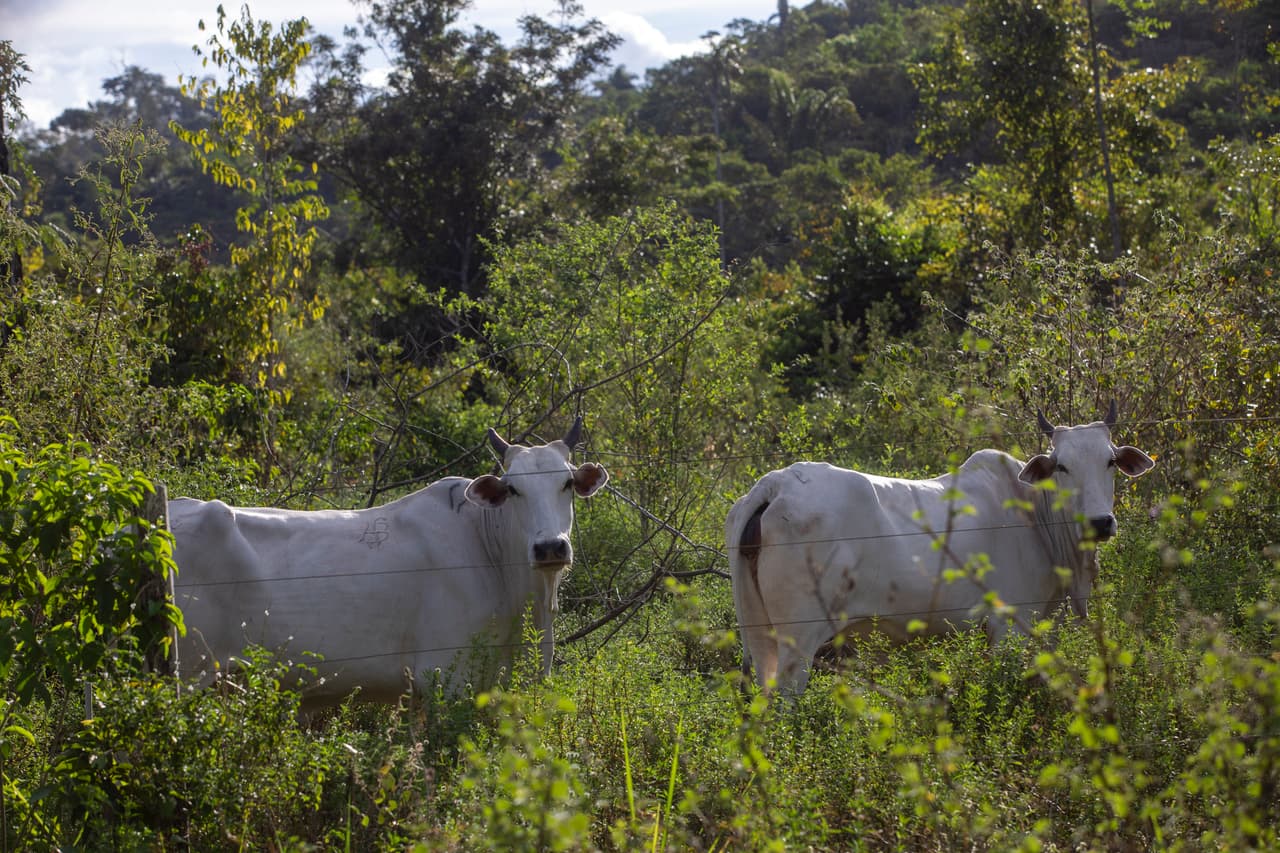
Supermarkets drop Brazil beef over links to deforestation
Sainsbury’s and five other European supermarkets have announced they will stop selling some or all beef products originating in Brazil because of concerns over links to deforestation in the Amazon rainforest and other ecologically important areas.
Sainsbury’s, along with Lidl Netherlands and others, took action after new research into “cattle laundering” involving JBS, Brazil’s largest meat business. According to Repórter Brasil, the company allegedly indirectly sourced cattle from illegally deforested areas.
A series of investigations by the Bureau of Investigative Journalism and The Guardian in recent years have exposed deforestation linked to the Brazilian beef trade, including reporting that first highlighted cattle laundering in July 2020.
The laundering occurs when animals raised on an illegally deforested plot of land are moved to a farm clear of deforestation to be fattened before slaughter. The process means the true origin of the cattle is often hidden, and critics say the problem is widespread in Brazil.
In the latest research, Repórter Brasil, working with the campaign group Mighty Earth, tracked beef products linked to deforestation – including beef jerky, corned beef and fresh meat – from Brazil to European supermarket shelves.
In the case of Sainsbury's, researchers found corned beef on sale that had been processed at a JBS slaughterhouse in Lins, São Paulo. According to Repórter Brasil, the abattoir had received cattle from a farm that fattens herds from other more remote ranches. Those remote farms have been officially sanctioned – “embargoed” – for illegal deforestation in the Amazon.
Embargoes are imposed on farms for environmental violations, such as illegal logging or tree felling, and serve both as a punishment and protective measure to allow land to recover.
In a statement, a spokesperson for Sainsbury's said: “The link between cattle farming and the destruction of ecosystems like the Amazon, the Cerrado, and the Pantanal is a complex issue, which we take extremely seriously. We have taken a range of steps together with our suppliers and the wider industry to try to address this, but not enough progress has been made.
“We are therefore committed to move our own brand corned beef sourcing away from Brazil.” The supermarket said this would ensure its corned beef could be “verified deforestation-free”.
JBS is one of the world’s largest meat companies, with annual revenues of $50bn. It slaughters almost 35,000 cattle a day in Brazil alone and its beef exports to mainland Europe increased by a fifth in recent years.
Like other major beef producers, the company says that it has a “zero tolerance” approach to illegal deforestation and has introduced sophisticated monitoring systems for its direct suppliers in the Amazon region. However, it has repeatedly insisted that it is impossible to monitor its indirect suppliers because there are no publicly available records of livestock moving between farms.
JBS said: “We have made extensive investments in a new blockchain-enabled platform to overcome this challenge [of monitoring indirect suppliers] and achieve a completely illegal deforestation free supply chain by 2025.”
The Bureau newsletter
Subscribe to the Bureau newsletter, and hear when our next story breaks.
In 2020, the Bureau, The Guardian and Repórter Brasil uncovered for the first time how JBS’s own trucks had transported cattle from a “dirty” ranch fined for deforestation to a supposedly “clean” ranch that supplied JBS abattoirs. The Bureau also obtained livestock movement records that revealed that thousands of cattle had been trucked on the same route.
Although JBS disputed the findings, the revelations directly contradicted the company’s claims that it was unable to monitor the more distant parts of its beef supply chain, and prompted calls for supermarkets and fast food chains to stop working with JBS.
An earlier investigation had also revealed the extent of the UK’s involvement in deforestation in the Amazon, showing that nearly £1bn worth of beef supplied by JBS and other meat packers tied to deforestation had been imported in recent years.
The Amazon is a crucial buffer in stabilising the regional and global climate. Preserving the world’s rainforests is essential if a climate emergency is to be averted, many experts say.
Yet between 1980 and 2005, deforestation levels reached 20,000 sq km a year. International demand for beef is directly driving the problem: about 5,800 sq km of forest — an area four times the size of Greater London — is being felled every year in the Amazon and other areas of Brazil to be converted into cattle pasture.
“This is a watershed moment because several huge supermarkets across Europe are saying an emphatic ‘No!’ to Brazilian beef over deforestation concerns,” Nico Muzi, Mighty Earth’s Europe director, said.
Reporter: Andrew Wasley
Environment editor: Jeevan Vasagar
Global editor: James Ball
Editor: Meirion Jones
Production editor: Frankie Goodway
Impact producer: Grace Murray
Our Food and Farming project is partly funded by Quadrature Climate Foundation and partly by the Hollick Family Foundation. None of our funders have any influence over our editorial decisions or output.
Header image: Cattle on deforested land in Brazil. Credit: Joao Laet for the Guardian.
-
Area:
-
Subject:




